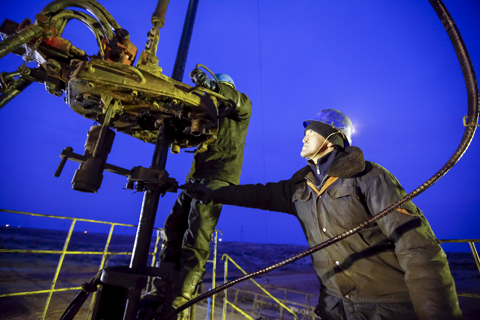How to deal with low hydrocarbons prices
Published in the United Kingdom (UK) recently, Low Price, High Expectations, an Association of Chartered Certified Accountants (ACCA) report, outlines the three key factors that energy sector C-suite executives need to monitor in order to achieve success in the most volatile and competitive era in oil and gas history, writes The Edge’s global energy editor Simon Watkins.
 Workers carry out maintenance at an oil well in Kyzylorda region, southern Kazakhstan. In January, the oil price crash slashed Kazakhstan’s total exports by more than 40 percent and the Kazakh tenge has lost half of its value against the dollar since last August when the authorities abandoned their pegged exchange rate policy. (Image Arabian Eye/Reuters)
Workers carry out maintenance at an oil well in Kyzylorda region, southern Kazakhstan. In January, the oil price crash slashed Kazakhstan’s total exports by more than 40 percent and the Kazakh tenge has lost half of its value against the dollar since last August when the authorities abandoned their pegged exchange rate policy. (Image Arabian Eye/Reuters)These measures are good management of growth, costs, and funding, Faye Chua, head of business insights for ACCA, in London, told The Edge. Integrated oil companies – those incorporate elements of upstream, midstream, and downstream activities – will find that managing growth opportunities is easier than for smaller exploration and production (E&P) specialists, as they are more diversified and therefore better able to withstand low hydrocarbons prices, added Chua. “A low oil price may hit upstream sales to third parties, but it makes oil purchases cheaper for the refining division,” she said.
Interestingly in this regard from the perspective of Qatar, the liquefied natural gas (LNG) sector appears less vulnerable than others in the hydrocarbons industry because a significant part of this output was pre-sold at a relatively high price in deals struck before hydrocarbons prices collapsed. Indeed, according to industry specialist, Wood Mackenzie, the number of prospective multi-billion-dollar export projects in the LNG industry where a final investment decision (FID) was expected to be made in 2015 and 2016, has not reduced significantly.
“Even if the gas has not all been pre-sold, a finance director may not feel that investing in such a project is a big risk, if he or she is convinced that gas prices will go up in a few years’ time, given that the project had always been accounted for as a long-term revenue earner,” continued Chua.
Cost management, then, needs to focus on concentrating asset sales on areas of the business not central to long-term strategy as much as possible, as no upstream business boss wants to sell off prized assets or abandon projects that could restore the company’s fortunes when oil prices pick up.
“There is an opportunity to re-negotiate discounts with contractors to manage service costs and ongoing expenditure,” read the ACCA report, “as there could be room here as many suppliers may prefer lower margins to idle machinery in the challenging times we are currently experiencing.”
With the global hydrocarbon industry’s debt repayments set to increase to USD550 billion (QAR2 trillion) over the next five years – with USD72 billion (QAR262 billion) maturing this year, rising to USD129 billion (QAR470 billion) in 2017 – funding management is the final key to surviving the current choppy environment.
John Mitchell, an associate research fellow at Chatham House, and a former BP executive, highlights two challenges in this context. “Raising funds from long-term bonds when interest rates are generally low is advantageous, but a low interest rate environment may not last, so the question is how much do you want to load up your company with debt?” he said.
On the subject, ACCA also stated in its report: “Firms with promising acreage in a developing country would typically hope to draw in substantial investment – and expertise – from large partners, and another solution is likely to come from experienced private equity firms prepared to take on higher-risk investments with longer payback times.”
Like this story? Share it.






